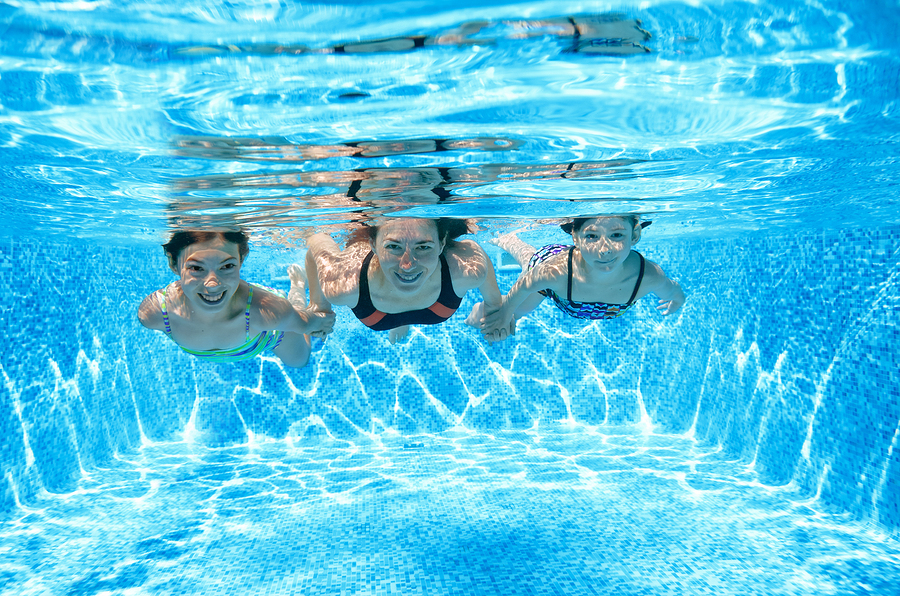Swimming is a popular activity that people partake in both for fun and for exercise when they are increasing or maintaining their fitness. It is most likely something that you learnt to do at school during your younger years, but this isn’t the case for everyone!
If you know how to swim but do not currently include it in your exercise routine, or if you have simply never been a swimmer, then the time to start could be now! It is a great way to improve your health and general fitness levels, as well as just being great fun! If you are someone who goes to the gym then your gym might have a pool that you could use before or after your workout, and if not then there will be several pools nearby for you to choose from!
Non-Weight Bearing Exercise
One of the best things about using swimming for fitness is that it is a non-weight bearing exercise, meaning it puts minimal stress and strain on your joints. This is great if you are suffering from an injury or localised weakness in certain parts of the body.
Non-weight bearing exercises are also a good choice for those in their later years as it massively decreases the risk of injury. For older people suffering from osteoporosis, swimming can be the perfect way to protect the body. This is because the benefits of exercise can be enjoyed without the potential hazards that come with the impact of weight-bearing exercises.
If you have been diagnosed with osteoporosis, arthritis or any other joint-related condition, then it is essential that you avoid high-impact activities, even if you are trying to lose weight or get fit. These kinds of activity could exacerbate your existing symptoms, or cause new issues to present.
Swimming for Health
When it comes to improving the health of your bones, swimming may not be the best exercise to choose. However, it can provide all-round health benefits that contribute to your general well-being. This is because the bones stand to benefit most from weight-bearing exercises, such as running, hiking, and active sports like tennis.
The benefits to your bones from activities weight-bearing exercises occur because of the stress you put your body under whilst engaging in them. This encourages your body to strengthen and your muscles to grow.
Weight Loss
When it comes to losing weight, swimming can really aid your efforts and will also work to tone your body as you progress. To really experience the weight loss benefits of swimming, you should aim to do it at least two or three times a week for thirty minutes or more.
If you are serious about losing weight then you should also incorporate other physical activities into your routine regularly, as well as paying close attention to your diet and lifestyle.
For further advice on how you can lose weight in a healthy and sustainable way, click to check out Which Foods Work For Weight Loss!
Injury Prevention
Even though swimming is a non-weight bearing exercise and therefore not the best choice for optimum bone health, it can be effective in helping the body to protect against fractures. Swimming is a good way to maintain muscle mass and to build new muscle, which is useful in protecting against fractures. This is especially helpful as you enter your senior years, as you can work to protect your body in a low-impact way!
It is also great for improving coordination, flexibility and balance – all of which are useful for avoiding injuries and accidents. These are aspects of your general health and fitness that you should prioritise at all stages of your life.
Cardiovascular Exercise
Swimming is a great form of cardiovascular exercise. This type of exercise is incredibly beneficial to your health on the whole, but is especially useful for the strength and function of your heart.
It helps to keep your body fat down whilst also reducing stress levels and can even improve the quality of your sleep. Cardiovascular exercise can also provide some relief from anxiety and depression as well as boosting your confidence.
Swimming and Illness Prevention
There is evidence to suggest that swimming regularly can reduce your risk of developing certain chronic illnesses, such as diabetes and heart disease. It is also thought to lower your risk of having a stroke.
There are many contributing factors for why this is the case, including many of the concepts already mentioned in this article, such as weight management and stress reduction.
Ready to Get Started?
Another great thing about swimming is that you need no specialist equipment to be able to do it. You simply have to buy some comfortable swimwear and head to your nearest pool! However, if you are swimming in a public pool, as opposed to outside in a lake or the ocean, then you may find that you also need some swimming goggles in order to protect your eyes from the added chlorine in the water.
If you are a beginner then you should always learn to swim in a public pool, for your own safety, and then progress to outside locations when you can be sure of your own abilities.
In addition to all of the amazing health benefits of swimming, it is also a good skill to have and could save your life or the life of another person one day. There is absolutely no age at which it is too late to start learning to swim and once you know how to do it, you will never forget! If you are concerned about an existing health condition before you start learning to swim, then there is no harm in checking with your doctor first to make sure you won’t experience any difficulties.
Swimming is a super fun activity that you can get the whole family involved in! Take your family for a fun day of swimming and they will be too busy having fun to notice all the great exercise they are getting too!
References
1) http://www.nhs.uk/Livewell/getting-started-guides/Pages/getting-started-swimming.aspx
2) http://www.livestrong.com/article/443091-the-effect-of-swimming-on-bone-strength
Related Posts
Cigarettes May Inhibit Inflammation Treatments
Axial spondyloarthritis, also known as AxSpa, is a chronic…










